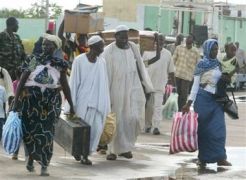Imams appeal for Sudan calm in Friday prayers
KHARTOUM, Aug 5 (AFP) — Muslim leaders appealed for calm during Friday prayers as a semblance of normalcy returned for residents in the Sudanese capital just days after deadly inter-ethnic rioting erupted.

|
|
Sudanese form the North with their southern wives walk to board a Russian-build cargo plane sent by the government to evacuate them from Sudan’s southern town of Juba on Friday, Aug. 5, 2005. Several Northern traders were killed in two days of riots in Juba after officials announced on Monday the death of southern Sudan’s political leader and country’s Vice President John Garang in a helicopter crash in southern Sudan. Southerners are suspicious the Arab-dominated government had a hand in his death. More than 130 people were killed in riots in Khartoum, the capital, and Juba and Malakal in the south, according to the Sudanese Red Crescent. (AP) |
The violent rampage was sparked by the death last Saturday of former southern rebel leader John Garang, leaving 111 people dead in Khartoum alone and a trail of devastation with cars torched and shops looted and smashed.
Religious leaders urged the hundreds gathered at the capital’s mosques to seek national peace and reconciliation during their sermons on Friday — Islam’s day of rest and worship.
“Those were isolated incidents and not an act of war,” the imam at the Grand Khartoum Mosque told worshipers.
“There are specific conditions under which jihad (holy war) should be declared,” the imam said. “Individuals have a right to defend themselves, but not declare jihad.”
Similar conciliatory messages came from other Islamic leaders across the capital, including Essam Mohammed Beshir at the Shahid (martyr) mosque.
“Our respect for a man who contributed to peace should not be expressed by violence,” he said of Garang who clinched a key peace agreement with Sudan’s President Omar el-Beshir in January, ending 21 years of north-south war.
“Let us forget these incidents and open a new chapter of peaceful coexistence and social peace,” the imam said.
There were signs of people getting back to their usual activities across the city, with women selling tea at street stalls, northerners and southerners sharing public transport and the reappearance of beggars, who had vanished during the riots.
“I feel safer,” said Ibrahim Fadallah, a seller of mobile phone accessories in the city center.
In Khartoum’s flashpoint suburbs, residents said while most people still favored staying home, life was almost back to normal.
“It’s calm here,” Michael Alor, a resident of the eastern Hajj Yussef neighborhood said.
“People are still staying home,” said David Jaden from the southwestern Kalakla neighborhood, one of the worst hit by the onslaught of rioting and revenge attacks that pitted people from the mainly Christian and animist south against northern Muslims.
He said northerners had stopped using mosques and loudspeakers to incite violence against southerners.
Although the security presence was noticeably lower than in the past four days, armed personnel carriers rolled back into the city at midday to guard mosques ahead of the prayers, an AFP reporter witnessed.
Khartoum’s governor Abdelhalim Mutaadi described the army and police deployment during the rioting as the largest in the city’s history.
Heavily-armed police and soldiers had been out in force and armored personnel carriers and police trucks mounted with machine guns patrolled the streets.
“Fortunately the situation is quiet. We haven’t received any reports of incidents overnight or this morning,” said ICRC press adviser Larena Brander on Friday.
She said the death toll in Sudan’s riots stood at 130, including 111 in Khartoum alone and 19 in the south following the death of Garang, leader of the Sudan People’s Liberation Movement/Army (SPLM/A) who was appointed vice president in a unity government only last month.
